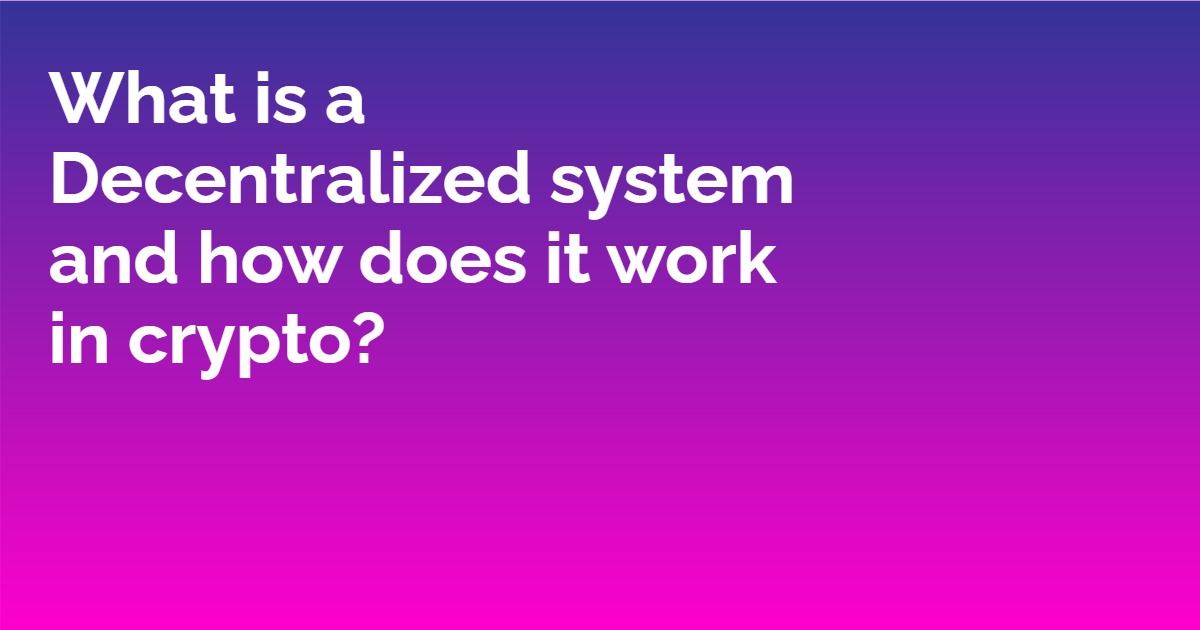In this article, we will explore what decentralized systems are, how they work in crypto, and the benefits and challenges of using them. We will also provide a call to action for those interested in learning more about decentralized systems.
What is a decentralized system?
A decentralization system is a network of nodes that are not centrally controlled. This type of system can be used to process transactions, store data, or power a cryptocurrency. Decentralized systems are often more secure and resilient than centralized systems.
A decentralization system can be more efficient than a centralized system because there is no need for a central authority. With a decentralized system, each node in the network can process transactions, store data, or power the cryptocurrency. This allows for a more distributed and resilient network.
A decentralized system can also be used to create a cryptocurrency that is not subject to government regulation or control. With a decentralized cryptocurrency, each node in the network maintains a copy of the blockchain, and there is no central authority that can regulate or control the currency.
What are the characteristics of a decentralized system?
A decentralization system is a network of nodes that are not centrally controlled. This type of system can be used to process transactions, store data, or power a cryptocurrency. Decentralized systems are often more secure and resilient than centralized systems.
One of the key characteristics of a decentralization system is that it does not have a central point of control. This decentralized structure makes it more resistant to attacks because there is no single point of failure. If one node in the system goes down, the others can continue to operate.
Another characteristic of decentralized systems is that they are often more efficient and scalable than centralized systems. This is because decentralization enables parallel processing of tasks across multiple nodes. This means that the system can handle more tasks simultaneously without slowing down.
Overall, decentralized systems have several advantages over centralized systems, including increased security, resilience, and efficiency.
How does a decentralization system work in crypto?
Decentralization is a key characteristic of many cryptocurrencies. Bitcoin, for example, is a decentralized system that allows anyone to send and receive payments without the need for a central authority. Ethereum is another decentralized platform that enables the development of decentralized applications.
What are the benefits of using a decentralized system in crypto?
A decentralized system can help secure digital assets and reduce the risk of fraud or theft. Additionally, a decentralized system can help to provide transparency and accountability in financial transactions. Finally, a decentralization system can help to reduce costs associated with traditional financial transactions.
Using a decentralization system in crypto has a number of benefits that can be extremely helpful for users. One of the most important benefits is that it helps secure digital assets. When there is no central authority controlling the system, it becomes much harder for hackers to penetrate it and steal information or money. This decentralized structure also makes it more difficult for fraudsters to commit scams, as they would need to deceive a large number of people rather than just one central entity.
Another great benefit of using a decentralization system is that it provides transparency and accountability in financial transactions. When all transaction data is stored on a public ledger, anyone can view it and verify that it is accurate. This increases trust between parties and helps to prevent disputes. Additionally, because there is no central authority controlling the system, there is no one who can manipulate the data for their own benefit.
Finally, decentralization systems can help to reduce costs associated with traditional financial transactions. When there is no need for intermediaries such as banks, the cost of conducting a transaction decreases significantly. This could make crypto more accessible to people around the world who currently cannot afford traditional banking fees.
Overall, decentralization systems offer a number of advantages that make them well-suited for use in crypto currencies. Their ability to secure assets, provide transparency and accountability, and reduce transaction costs makes them an attractive option for those looking for an alternative to traditional financial systems.
What are the challenges of using a decentralization system in crypto?
The main challenge of using a decentralization system in crypto is ensuring that all nodes in the system are trusted and secure. In order to ensure that all nodes are secure, each node must be independently verified. This verification process can be time-consuming and expensive.
Another challenge of using a decentralization system in crypto is ensuring that the system is scalable. A decentralized system must be able to handle a large number of transactions without compromising security or performance.
Finally, a decentralization system must be resilient to attacks. A 51% attack, for example, could allow an attacker to control the majority of the network and reverse transactions or double-spend coins. To prevent this type of attack, a decentralization system must have robust security measures in place.



